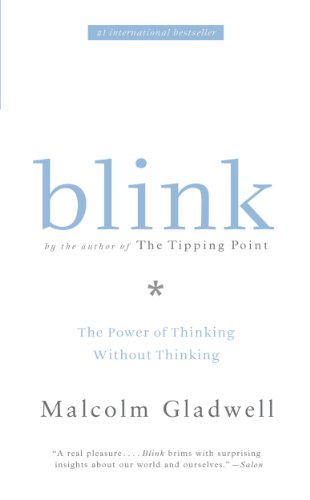

This article is an excerpt from the Shortform summary of "Blink" by Malcolm Gladwell. Shortform has the world's best summaries of books you should be reading.
Like this article? Sign up for a free trial here .
Are you looking for Blink quotes by Malcolm Gladwell? What are some of the most noteworthy passages worth revisiting?
We usually think of snap judgments as lazy, superficial, and probably wrong. But are they really? In Blink, Malcolm Gladwell argues that snap judgments can be just as good as—or even better than—the decisions that we make when we analyze a situation carefully.
Below is a selection of quotes from Blink: The Power of Thinking Without Thinking by Malcolm Gladwell.
Blink: The Power of Thinking Without Thinking
Most of us have been taught that to make good decisions we need to put in a lot of time and effort. In Blink (2005), Malcolm Gladwell questions this assumption, asking: How do our snap judgments compare to our rational, well-thought-out decisions? He finds that our snap judgments are often just as good as our deliberate decisions.
The following Blink quotes by Malcolm Gladwell highlight some of the key ideas.
“We live in a world saturated with information. We have virtually unlimited amounts of data at our fingertips at all times, and we’re well versed in the arguments about the dangers of not knowing enough and not doing our homework. But what I have sensed is an enormous frustration with the unexpected costs of knowing too much, of being inundated with information. We have come to confuse information with understanding.”
Most of us have been taught that to make good decisions we need to consider as much information as possible. But sometimes the right decision is a less informed decision. Too much information can overwhelm you with details and obscure the bigger picture.
According to Gladwell, you don’t actually need a lot of information to identify patterns—just the right information. If we want to protect the integrity of our snap judgments, we need to limit the data we consider when making a decision.
“Anyone who has ever scanned the bookshelves of a new girlfriend or boyfriend- or peeked inside his or her medicine cabinet- understands this implicitly; you can learn as much – or more – from one glance at a private space as you can from hours of exposure to a public face.”
According to Gladwell, judgments about personality are often best made through what he calls “thin-slicing” rather than rational analysis. He cites the research of psychologist Samuel Gosling to illustrate this point. Gosling discovered that you can make surprisingly accurate judgments about someone you’ve never met just by looking around his or her dorm room for 15 minutes.
Why? Bedrooms expose patterns. They give a peek into your private life that is revealing. An unmade bed, posters on the wall, or a fluffy ottoman can tell you just as much about a person as meeting him or her, if not more.
A bedroom without its occupant inside it contains well-selected information. It excludes distracting and irrelevant information. Stereotypes triggered by a subject’s presence were absent. If you meet a quiet, econ major with glasses, you may never guess she’s a hardcore heavy metal fan. If you judge her by her vinyl and paraphernalia collection, you get a different picture. The people themselves weren’t there to get in the way. We can’t view ourselves objectively, so we often say confusing or contradictory things about ourselves to other people. By just looking at someone’s bedroom, we avoid this white noise.
“When we talk about analytic versus intuitive decision making, neither is good or bad. What is bad is if you use either of them in an inappropriate circumstance.”
Our brain uses two broad strategies for making decisions: conscious or deliberate decision-making and unconscious or intuitive decision-making. We usually think that deliberate decisions should be the way to go. But are they really? According to Malcolm Gladwell, both logical, conscious decision-making and snap judgments have their time and place.
Part of how we can make better decisions is to understand when the deliberate approach is best, and when the intuitive approach is best. Gladwell suggests that, where possible, we start with deliberate decision-making. This lays the groundwork for future rapid cognition.
“We have, as human beings, a storytelling problem. We’re a bit too quick to come up with explanations for things we don’t really have an explanation for.”
When we don’t know why we’ve made a certain decision, we make something up. We don’t lie on purpose. We actually believe the lies that our conscious minds construct to explain the decisions of the unconscious mind.
Gladwell offers two solutions to stop rationalization from getting in the way of good decisions.
Gladwell’s Option #1: Don’t try to explain your snap decisions. Honor the mysteries of the unconscious mind, and admit that you don’t always have the answers, even those pertaining to your own choices. Once you’ve created a story to explain an unconscious decision, that story is hard to shake. We believe the stories we tell ourselves and others.
Gladwell’s Option #2: Attempt to enhance your conscious perception through technology or recording techniques that slow down the flow of information. For example, use slow-motion videos for sports technique analysis. This allows your conscious mind to catch up to your unconscious, giving you a chance to double-check your unconscious judgments.
———End of Preview———

Like what you just read? Read the rest of the world's best summary of "Blink" at Shortform . Learn the book's critical concepts in 20 minutes or less .
Here's what you'll find in our full Blink summary :
- How you can tell if a marriage will fail, within 3 minutes
- Why your first impressions are usually surprisingly accurate
- The dark side to making first impressions, and how to avoid the,






